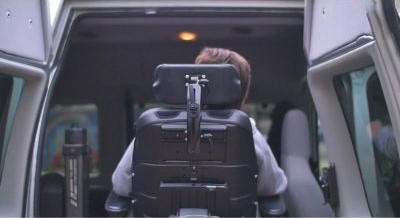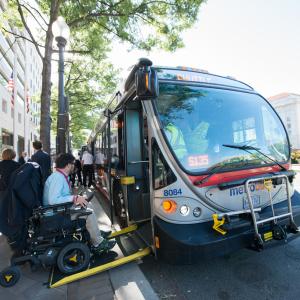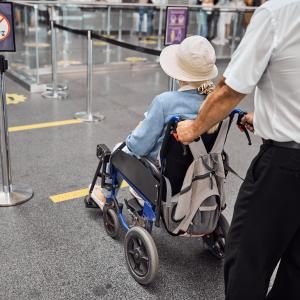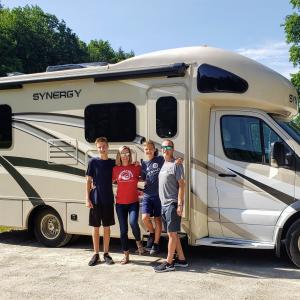There are all sorts of holiday traditions, many of them unique to the families that celebrate them. One tradition many people have in common, however, is travel. Estimates are that nearly half of Americans will make some sort of trip between late November and early January.

For people with ALS and their families, traveling presents challenges beyond the typical concerns about weather, delays, and traffic jams. But with some planning and patience, you can ensure everyone is able to make it to their destination safely.
Regardless of whether your trip will be by plane, train, or automobile, there are some steps people with ALS should take before leaving home. You should always check with your doctor and ALS care team before any extended trip. It is also a good idea to carry a letter from your health care provider, preferably on letterhead, which describes your medical condition, medications, potential complications, and other pertinent medical information. At home, it’s a good idea to have emergency contact information and a copy of your itinerary readily accessible by a trusted family member or friend who is not traveling with you.
If you take prescription medication, make sure you have enough to last during your entire trip plus enough to allow for any delays you might face. Before you leave, ask your pharmacy or physician for the generic equivalent name of your prescriptions in case you need to purchase additional medication while you are away from home.
When planning your trip, be conscious of your energy level and be sure to build in enough time for breaks to rest. If you are traveling with a group, be sure to let everyone know what your needs will be on the journey and what role they may need to fill along the way. You may also want to consider if a change to your mobility equipment might be helpful. For example, if you use a walker, you might want to use a wheelchair instead while you are traveling. This can help you save your energy for the activities you are planning.

Many of us will find ourselves traveling familiar routes over the holiday season, which can be beneficial for travelers with ALS. You may want to plan your stops in advance if you know the accessibility of restaurants or gas stations on your way. This can also be helpful at your final destination if you are visiting with family and friends in a familiar location.
If your destination is new or unfamiliar to you, it is a good idea to ensure it is accessible ahead of time. When you first call, tell the person you’re speaking with that you have specific accessibility needs and ask them if they can connect you with a colleague who will be able to provide detailed information. Be ready with specific questions to be sure any accommodations meet your needs.
Air travel presents its own challenges for people living with ALS, but with the right planning, everyone involved can fly safely. First and foremost, you should discuss your plans with your doctor before you book to determine if you are safe for air travel. Air pressure is different in a plane, and you may need a special test to ensure that you are safe to fly.
Once you’ve determined you are safe for air travel, make your reservations as far in advance as possible. Be sure to let the reservations agent know if you will be traveling with a wheelchair or scooter and any other accessibility needs you may have. You’ll also want to notify the airline if you plan to use a respiratory device during the flight. Disability-related aids—personal medical oxygen, ventilators, nebulizers, respirators, CPAPs, BiPAPs, Trilogies—are allowed through security checkpoints once they have undergone screening and do not count toward the limit on carry-on items. Make a note to confirm with the airline that they have a record of your requests and requirements at least 48 hours prior to departure.

All airline passengers must undergo screening at the TSA security checkpoint. If a passenger with a medical device, medical condition, or a disability is approved to use TSA PreCheck®, he or she does not need to remove shoes, laptops, 3-1-1 liquids, belts, or light jackets during the screening process. However, everyone is required to undergo screening at the checkpoint by technology or a pat-down.
Any traveler requiring special accommodations or concerned about the security screening process at the airport may ask for a passenger support specialist (PSS) who can provide on-the-spot assistance through TSA Cares at 855-787-2227. Contact TSA Cares at least 72 hours prior to a scheduled departure to ensure coordination of your request.
Once you are through the security checkpoint, make arrangements to check your chair or scooter at the boarding gate and request it be brought back to you at the gate when you arrive and/or during a layover between connections. It is suggested that you use gel or foam filled batteries (also known as dry cells) in your scooter or power chair and be sure they are fully charged and will have sufficient battery life for your trip before leaving. Before landing, remind your flight attendant that you will need your equipment brought to the gate, so they can radio ahead to make the arrangements.
In the unfortunate event you have problems or damage to your equipment, ask to speak to a Complaint Resolution Official (CRO). Each air carrier is required to have a CRO available by phone or in person during operating hours. This person is specially trained in dealing with problems that travelers with disabilities may encounter.

Regardless of whether your holiday travels take you over the river and though the hills, or up into the wild blue yonder, planning ahead and knowing where to find help along the way can help ensure that everyone, everywhere can enjoy this time of year to the fullest.
To continue to follow stories about people living with ALS in the community and learn more about the disease, follow our blog HERE.


Comments
Please send any info available
Julie, please reach out to your local care team for personalized information and suggestions: https://als.org/local-care.
Join the conversation. Please comment below.